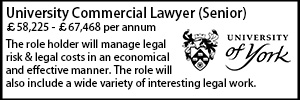Marshalling evidence in special educational needs cases
- Details
John Roberts reports on a successful result obtained by a local authority in the Special Educational Needs Tribunal.
BLM has acted for a local authority in a case in which an appeal was made to the Special Educational Needs Tribunal for Wales. The case, which demonstrates the difficult evidential hurdles an Education Authority needs to clear to persuade a Tribunal that its decision is correct, concerns a young boy, B, who has significant behavioural difficulties in addition to dyslexic and dyspraxic traits. The appeal was brought by B’s parents.
Background
B struggled academically whilst at primary school, despite substantial additional support including the provision of a 1:1 teaching assistant.
B transitioned to mainstream secondary school C and was placed within its specialist ‘Base’ i.e. a ‘school within a school’. The Base was a small unit containing a handful of classrooms. It is designed to provide additional support to pupils with moderate behavioural and academic difficulties.
B’s behaviour was extreme and frequently violent towards other pupils and staff. He routinely swore at pupils and teachers. He was constantly disruptive, upsetting other vulnerable pupils and often destroying their work and other resources. He also lied about his behaviour and its impact. After approximately two terms, School C indicated it could no longer meet his needs and he would be the subject of a permanent exclusion, though he was withdrawn beforehand by his parents.
Authority A contended that B should be placed at a specialist school, designed to accommodate children with such difficulties, including social, emotional and behavioural difficulties (SEBD).
B’s parents argued that he had a severe language disorder which had not been diagnosed or addressed by A. The disorder resulted in B being frustrated, causing his behaviour and lack of academic progress. With proper help, B’s behaviour was likely to improve and therefore he could be placed at school D; a mainstream school with a Base, similar to school C. The parents relied upon the evidence of several experts including an educational psychologist and a speech and language therapist. B also argued that he had been bullied whilst at school C.
Relevant legislation
The Tribunal considered in particular S.9 and S.316 of the Education Act 1996
S.9 broadly provides that pupils are to be educated in accordance with the wishes of their parents, save where that would involve unreasonable public expenditure.
s.316 stipulates that a child should be educated in a mainstream school (such as C or an equivalent) save where to do so would be incompatible with the efficient education of other children.
Tribunal decision
Though it was agreed that B had a severe language disorder, under cross examination, B’s speech and language therapist conceded that this was one of several reasons for B’s behaviour and it would be too simplistic to exclusively link the two. Absent the severe language disorder, the likelihood was that B’s behaviour would have been similar.
A’s evidence persuaded the Tribunal that B had been almost impossible to manage at school C. His behaviour had placed unreasonable demands on staff time and resources, to the clear detriment of other pupils, many of whom also required additional support. The Tribunal accepted that the most likely outcome was that B’s behaviour would continue if placed at school D. A’s evidence also demonstrated that school D would not be able to accommodate B without significant disruption to vulnerable pupils placed there. That clearly would be incompatible with their efficient education. B was also the protagonist of most of the incidents in which he had been involved and there was no evidence of bullying.
The Tribunal also found that the adjustments needed to educate B at school D were not reasonable. Significant expenditure on buildings and staff would be required. The authority responsible for school D would have to create a separate unit within school D’s base, which was not reasonable.
The Tribunal was also persuaded that Authority A had properly considered the appropriate provision for B. The specialist school it proposed was best placed to meet his identified needs. If B was placed at school D, the most likely outcome was that he would promptly be the subject of a permanent exclusion, which could harm B.
The Tribunal ultimately found that the most suitable placement for B was the specialist school named in Part 4 of the Statement of Special Educational Needs by the Authority.
Lessons learned
This was a difficult and unusual appeal, contrary to the usual position where parents are appealing for more assistance for their child. The evidence initially suggested that the severe language disorder was the cause of B’s difficulties and had not been diagnosed by Authority A. The appropriate marshalling and disputing of evidence undermined this contention, persuading the Tribunal that B’s behaviour had multiple sources.
The importance of obtaining clear and persuasive evidence of a school’s experience of a pupil and the likely impact of any placement proposed by the parents cannot be overstated. The same is true of the assistance that can be provided by an authority’s in-house expertise, such as its educational psychologists.
John Roberts is a partner and public sector specialist at BLM. He acted for the local authority. John can be contacted on 029 2044 7643 or









































